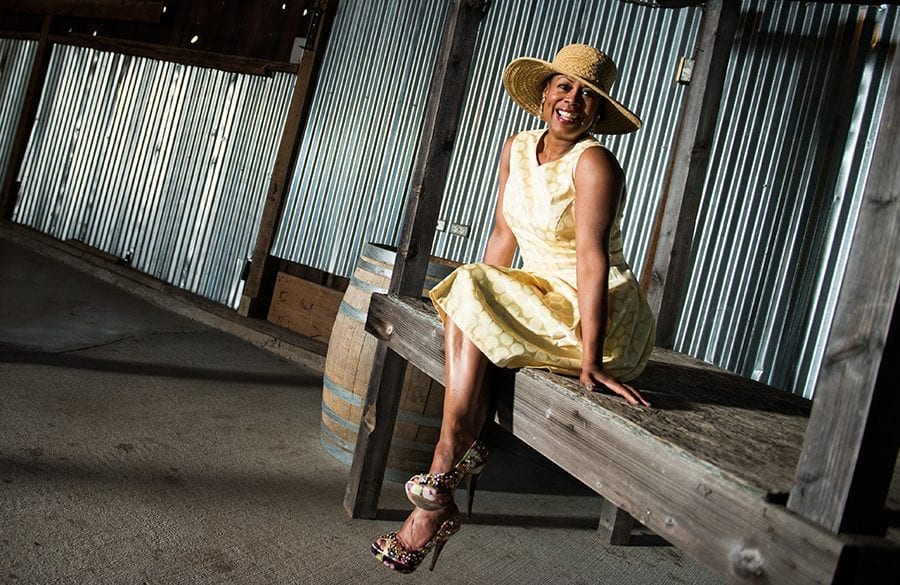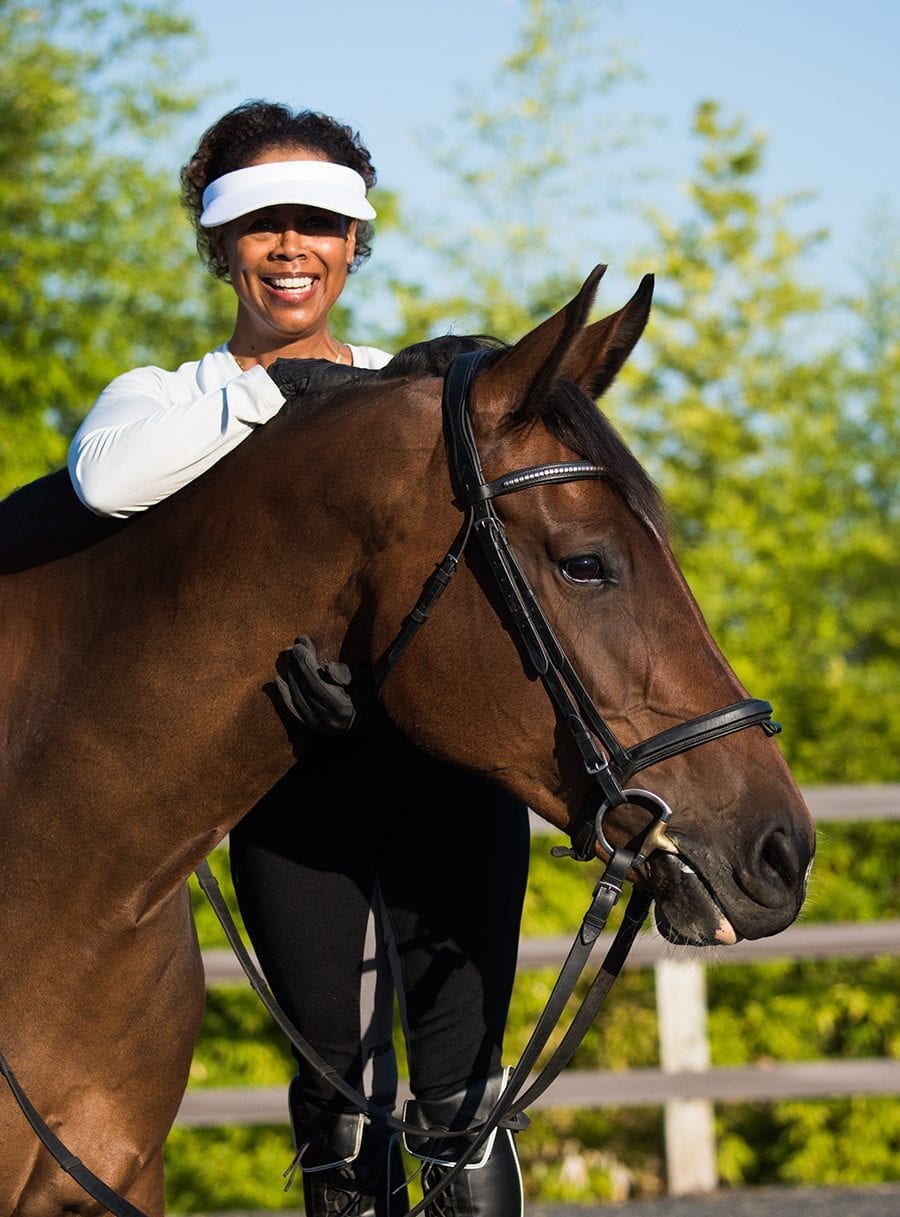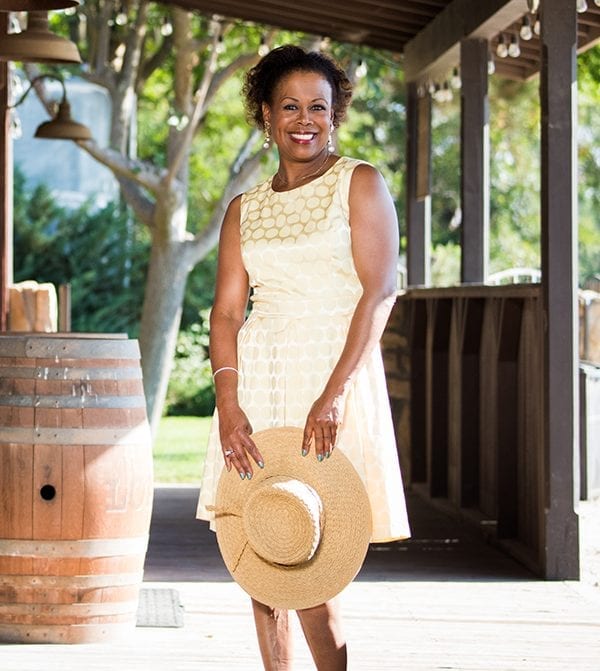https://youtu.be/9Ylq0kwnnCA
Hunter/Jumper & Public Broadcaster
Overcoming incredible odds in a sport dominated by the wealthy, Donna Cheek’s supportive parents turned her dream into a reality when at age seven, she began taking riding lessons. A hunter/jumper for more than 45 years, Donna made sports history, becoming the first black woman to join the U.S. Equestrian Team in 1981 and the first equestrienne to be inducted into the Women’s Sports Hall of Fame.
You were seven when you started taking riding lessons. Were you exposed to horses before taking lessons?
No, I was just a little girl that collected plastic model horses. I have loved horses for as long as I can remember. That was it. It is strange, really inexplicable, because nobody in my family rides. I was not exposed to horses at a young age. It truly was just a God-given passion that came out of nowhere. I have no idea why. But it’s a passion that has continued to this day.
Your father was a professor?
He was a tenured professor in the Education Department at Cal Poly, San Luis Obispo teaching ethnic studies. He has a Ph.D. in social psychology.
Tell me about your mother.
Well, my mother passed in 1989. She was a stay-at-home mom with five children. I am the youngest and have four older brothers. My parents were madly in love until the day my mother passed away.
Your parents were instrumental in your equestrian career and your serving as a member of the United State Equestrian Team?
Yes. My mother chauffeured me around until I got my driver’s license and could haul my own horses. It’s amazing because my parents were both born and raised in Harlem, New York. There is really nothing country about them except that they did buy acreage. They wanted to live in the country, but they had no experience with country living. Then, I ended up getting involved with horses. There was a point early in my career that my mom would load up the horse by herself, pick me up at my high school, and then drive me to my riding lessons. I have no idea who taught her how to hook up a trailer or even how to pull a horse trailer. All I know is that my parents did whatever it took to make things happen for their children.
Your four older brothers, were any of them drawn to the equestrian world, or you truly were the first?
They had no clue. To this day, I don’t think they realize what I do. Steve, the brother that’s closest to my age, traveled with me when I was inducted into the Women’s Sports Hall of Fame and recently when I was inducted into the Women’s Sports Museum. So, I think he has an idea. But everybody else thinks “Donna rides, and she’s been riding forever.” Period. End of story.

Do you feel a connection to horses more than human beings?
I feel that if human beings could conduct themselves with the honesty and integrity and love that horses have, just half of what horses have, our world would be Heaven on Earth because there is nothing that a horse can’t heal in a human.
Can a horse be jealous?
Absolutely. Horses can be jealous. I have seen it and experienced it. Horses become attached, and they understand when their person is with another horse.
Do you have a favorite horse, one which you were attached to more than any other?
No, I cannot say I have a favorite. The horses that have come into my business, my life, or my career are so individual. Each relationship is so different and special. I don’t have children, but I would imagine that question would be like asking a mother to decide which child is her favorite. That is not something that a mother can do, and it is not something that I can do. I don’t see my horses as a tool to get me from Point A to Point B in my career. I don’t see them as a tool I use to succeed and win. They are my partners, and they are my friends. There are times when I’m taking care of them and times when they are taking care of me.
Was it your father that instilled in you his competitive spirit?
Yes. My father is still involved in athletics. He participates in Masters Track at 88 years old. He is my hero and my role model. He personifies discipline, focus, and perseverance; all of the things that it takes for an athlete to become the best. My Dad was the one that molded me in that respect. He was the one that kept my mind right while pursuing excellence. It is not about just being on the horse. There are so many other things that contribute to the making of a champion. It is a lifestyle. It is what you eat, the rest that you get, the additional exercise that you do in the gym, the cardio that you do on the mountain, going to a chiropractor. It is a very holistic perspective. People sometimes assume the horse does all the work, but they’re very wrong.
Do you still practice the “champion” regimented lifestyle?
I do. This is still my lifestyle. I have been doing this for so long that it is just a part of staying fit, healthy, and capable. I couldn’t imagine living my life any differently.
What brings you the most joy?
Not just joy, but peace and contentment. I think joy is what, on the outside, affects your mood. Contentment comes from within, and peace is a theme of a person’s life. What brings me joy, contentment, and peace is my relationship with the Lord.

“For me, a successful person is a person that gives back at every opportunity they are given, even if it is during the time they are striving to reach their own goal.”
![]()
Was there a pivotal moment in your life that changed you, from a faith/religious perspective?
Yes, when I was living in Carson, California and training in Laguna Beach, I stayed with a family. Dave Jackson, Jr. led me to the Lord. I was never the same. And then I brought that excitement to my parents. My mom and dad received the Lord in their life and made a commitment. Dad has been involved in the ministry for decades now.
Has your faith ever wavered since that experience in 1979, until present?
Wavered, yes, because that’s the journey. Whatever kind of faith you may have will be tested if you live long enough. Life will test your faith over and over and over. My faith has only grown deeper and deeper as I go through life’s trials. It is my anchor. My Lord is my anchor. That relationship is not just a one-hour, once-on-Sunday thing. I spend a lot of time alone. When I am on the mountain, running up and down the hills, I am surrounded by his creation. We have conversations (not audible on his part), but certainly audible on my part. Let me tell you, he’s heard an earful for sure. I am so blessed to have constant, unconditional acceptance and such a loving relationship with my earthly father; so, it is very easy for me to transition to the same kind of relationship with my Heavenly Father. He is very real to me. There are times when I fuss at him because I believe certain things should be a certain way. But his wisdom is infinite. I fuss anyway because I feel better when I put it out there. Then, I just acquiesce to the knowledge that he loves me, and he knows best. So, there it is.
What do you call a success?
Success has to be multi-faceted. I have spent time with and talked to other athletes that are very accomplished. I am really glad that I am not one-dimensional and feel that the only thing worth living for is my sport because once I am not competing in the sport, there is no more Donna, or if I don’t continue to produce or reach the goals that I’ve set, then I’m a failure. I can definitely credit the balance that I seek in life to my father and to my family because I have successful relationships. I have never been married. That is the one the Lord needs to handle. But when it comes to my friendships and my family, my relationships are intimate. They are not casual or superficial. When we talk about success, yes, it’s great to reach the pinnacle and be given awards and receive acknowledgment. Those moments are great, but that’s only part of it. I honestly do not think you can be a success unless you give back in some way. You can’t always take. For me, a successful person is a person that gives back at every opportunity they are given, even if it is during the time they are striving to reach their own goal. I do not think opportunities to give back are made by the person who’s ready to give. When those opportunities present themselves in our lives, we have to say, “Yes, I’m going to do this. I am going to give my time, my money, and love.” I also do not think giving is so calculated. We give when someone is in need and that happens in a very random fashion.
You owned and operated a horse consignment and training center in Paso Robles?
It was great. I didn’t feel like I had a consignment business. I felt like I was running an orphanage for equines. You have to understand that the horses came to me because they were rejected by some other place. For whatever reason, they weren’t wanted anymore. My goal was to place them in their forever home. I had to nurture and bolster their confidence and love them so that the rejection did not define them. They were aware of being rejected, yet that rejection can fade into their past. They can feel hopeful about their future, and tell me what it is that they really want to do. People think, “Oh, this horse loves to jump,” and then the horse tells me, I hate it. Sometimes I have found no one’s ever listened to them. And so, I listen. I put together a plan. They may come into my business, my barn, doing one thing and leave doing something completely different. But it’s what they want to do. I placed them into an environment where they could shine. I like to say that I am “setting them up to succeed.” I’ve done that with horses in the past, in my consignment business, and with the horses that I’m working with now. I have a platform because I am an unusual person in the sport. I want to use my platform to bring an awareness and sensitivity to how animals should be treated.
When you transitioned away from your consignment and training center, was that a difficult transition?
Yes it was. I have retired multiple times in my career. I really have. The horses call me back in different ways. I always go back. I don’t know when or if it’s going to happen again. Retirement is difficult for me and let me tell you why. It’s difficult because these horses are such a deep, deep part of everything that I am. It is impossible to explain, something that only God could have made happen, because it’s not just love. I’ve honed it into an expertise. I’m truly, truly great at what I do. I’m only great at it because, when you’re dealing with a live animal, there are so many variables, and you have to be very adaptable. Trainers who try to ride and train every horse the same way will have very limited success and very unhappy horses. Their horses do not hold up, physically and mentally. But I change the lives of the horses that I work with. I absolutely do, and it’s not really because of anything that I set out to do. It’s because that is what I was called to do.
Do you think that life is a series of singles instead of home runs?
Absolutely. It is a long, perilous journey, especially when you’re reaching for the top. It’s incremental success, nose to the grindstone. Success is when, even though it’s raining, you still go outside because your competitor may be running, working out in the gym, or riding or schooling their horses in the rain. So, you school in the rain, in the heat, seven days a week and not just one day at a time. It has to be every single day because one day at a time for a week will not cut it. It just becomes your life-style, and that is why I haven’t changed.
You made history as the first woman of color to become a member of the United States Equestrian Team in ’81. Can you describe your feeling?
I don’t think I’ve ever felt more patriotic. When you are on the world stage, that’s when you feel the most proud to represent your country. It is a very powerful, patriotic feeling that I’m not just representing myself. I’m not just representing women. I’m not just representing black people. I’m representing my country. That is really powerful, and not everyone has the opportunity to do that.
When the Women’s Sports Hall of Fame came along, was that any kind of realization that you had broken so many barriers and, to a certain extent, established yourself as an example for other women and others to follow?
I don’t want to minimize what that represented and how that could have inspired people, but what’s very interesting is that when you’re so focused on a goal, these things are blips that happen on your way to that goal. You are really not able to bask in the limelight. My parents could always appreciate my accomplishments and understand the ramifications. I really didn’t at all.

Equestrian is such an expensive sport. Can you talk to me about that at all?
Wow. Yes, I was talking with another trainer, a great friend just the other day. We were both thinking how grateful we were to have had an opportunity to benefit from all that horses can give to an individual, during a time when riding was relatively accessible to the middle class. Entering the equestrian world without financial backing was a challenge then. But now, forget about it. You cannot even think about playing with the big boys. When I was competing, we didn’t have these imported warmblood horses that were beyond six figures. We were using thoroughbreds off the track, repurposing them. You had to be a skilled rider because these horses are hot-blooded and sensitive. You had to be really patient and pace yourself. Because they are not very durable and have a fine skeletal structure, you couldn’t push them too hard mentally or physically. Today, it is totally different. What I did could never happen now, not even a snowball’s chance, because now there is such a defining line. It is unfortunate, but the opportunity to have a competitive experience today with horses is just nonexistent. There’s nothing middle of the road. That has dried up. Either you are completely backyard (literally meaning keeping your horse in the backyard) hauling to some local C-rated shows, or you are in the one percent with total access, spending massive amounts of money. It really is sad because riding is so inaccessible, so there’s no need in me inspiring anybody. It’s great that they want to package the sport and to encourage kids and maybe other people of color and broaden its appeal. That sounds really good on paper. But you know what? It won’t happen. It won’t happen because other people of color cannot relate to the black riders out there now have the means to compete.
Can you impart your life lesson for equestrians to follow, and me, as a gift?
I would tell that young person, “I want you to enjoy every single day that you have with the horses you have access to. Don’t ever feel that not making whatever goal that you have set for yourself makes you a loser or makes you feel lesser than.” I would say, “You have to enjoy the journey. Your journey may not end up at the Olympics. It may not end up at the World Cup. It may not end up where you had planned, but it’s okay if you savor the process, and you don’t allow your pursuit to eclipse everything else. You’ve got to enjoy the rest of your life, and that’s only a part of it.”

